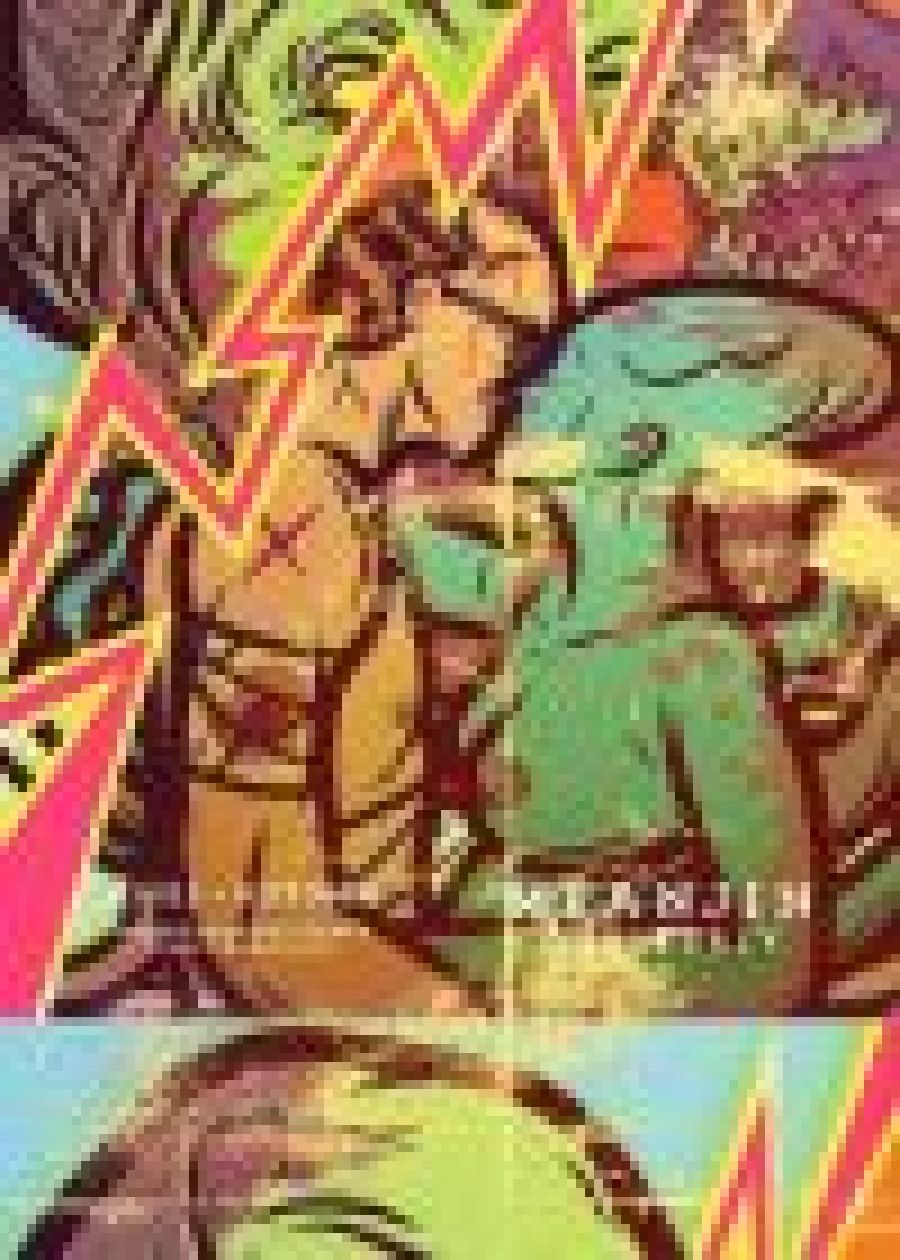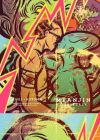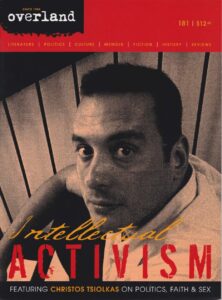
- Free Article: No
- Contents Category: Journals
- Custom Article Title: Chips on the table
- Review Article: Yes
- Article Title: Chips on the table
- Online Only: No
- Custom Highlight Text:
Like Monaco, journals are sunny places for shady people. Black sheep and dark horses have often found a first sanctuary there. Precarious principalities, they are built on the shifting sands of subsidies, sponsorships and subscriptions. But their lifeblood is won or lost at the roulette wheel of submissions and commissions.
- Book 1 Title: Meanjin
- Book 1 Subtitle: Vol. 64, No. 4, 2005
- Book 1 Biblio: $22.95 pb, 216 pp
- Book 1 Cover Small (400 x 600):

- Book 1 Cover (800 x 1200):

- Book 2 Title: Overland No. 181
- Book 2 Subtitle: Summer 2005
- Book 2 Biblio: $12.50 pb, 112 pp
- Book 2 Cover Small (400 x 600):

- Book 2 Cover (800 x 1200):

James Grieve’s ‘Working with the Demented’ is a highlight. The essay is an uproarious behind-the-scenes exposé of Penguin’s recent new translation of Proust’s à la recherche du temps perdu (2002). One of the edition’s seven translators, Grieve catalogues the disastrous decisions that led to its ‘mainly negative’ reviews. He vigorously upholds the critics’ complaints and, like a salesman pointing out the shoddy workmanship of his wares, adds one or two of his own, for good measure. Translators have long been tormented by the Italian homophone traditore/traduttore. Grieve makes an unlikely witness for the prosecution. Extraordinarily, the essay reads as a plea for readers to content themselves with their C.K. Scott Moncrieff (1922–31).
Equanimity of this kind seems to come as second nature to translators, generally. Meredith McKinney, in her essay, ‘Pillow Book Talk’, is at pains to explain that translation work is more salvage operation than encounter with the sphinx. Put your ear to the rubble of a neglected classic and you’ll still hear the writer gasbagging, she says. According to her, translating the Japanese classic The Pillow Book was a simple case of shaking Sei Shônagon free from the ‘accumulated burden of the centuries’. The author may be dead for the literary critic, but for the translator she just needs a dusting off from someone with a toothbrush.
For Simon Patton, too, TLC is the secret of a good translation. ‘The Riches of the Soul’ maintains that fluency in the source and target languages counts as nothing compared to a genuine, instinctive ‘feel’ for the text as an artistic object. First and foremost, the translator is a sympathetic reader, whose understanding of the work springs from a kind of soul recognition.
For those of us who have read our Dostoyevsky, Proust and Kafka in English without a thought for the truckler who has made it possible, the issue serves as a crib on past and present approaches to translation. I can report that becoming au fait in the debates surrounding ‘foreignisation’ is some salve for the unhappy monolinguist. But a handful of the contributors are content to amuse. Humour may be the first thing to perish in a foreign language, as Virginia Woolf said, but failures of translation, as any traveller knows, have often been the cause of it. Linda Jaivin casts a few purlers, like the one about the scene in Sam Peckinpah’s Cross of Iron, in which a soldier’s cry of ‘Tanks! Tanks!’ appears as ‘Merci! Merci!’ in the subtitles. Is Jaivin Australia’s most delightful femme des lettres? That’s a rhetorical question – and her essay here’s my proof. The issue also catches J.M. Coetzee in a genial mood. His ‘Roads to Translation’ is as direct and generous as I’ve ever known him to be about his writing. The essay lets us take a peek at his correspondence with the German, Chinese, Serbian, French, Korean and Dutch translators of his novels, and confirms that ‘the urge to give one’s best even when it may not be noticed’ reigns among them.
It is the big-heartedness of the translator at work that the journal, ultimately, celebrates. The issue is replete with new English translations of ancient, modern, famous and unknown texts. There is, as always in Meanjin, a particular commitment to poetry, and this time around there’s a distinctively Chinese flavour to the selection. As for the fiction, Harry Aveling’s translation of the Vietnamese folktale ‘Love’s Crystal’, and Chris Andrews’s of Hélèna Villovitch’s ‘La Plaine-Voyageurs’, were as lively as any original. One doesn’t think of Meanjin as being overtly political, but the editorial line is clear, irrespective of the appeals to Howards End’s ‘Only connect!’ sermon: translators are important and we’d be at a loss without them. In actual fact, we’d be less without them.
Overland has other ideas on the question of who will save us. Forget diffidence: we need to translate what Nathan Hollier calls ‘that weird feeling, somewhere between outrage and resignation’ into full-blown intervention. We need to heed the rallying call of the ‘intellectual activist’. The journal seems to see its role in all of this as part-educator, part-provocateur. The jab-hook method is applied this issue.
With scornful monikers like ‘George Dubya’ and ‘Uncle Sam’ doing the rounds, it’s clear Overland isn’t in the business of providing unbiased commentary. That said, the ‘Current Affairs’ section of this issue makes essential reading. Paul Holding’s ‘The Hurricane, the USA & Us’ unearths some startlingly accurate predictions of the Katrina disaster in order to prove the culpability of the Bush administration for the failures of the Federal Emergency Management Agency. Perhaps most interestingly, Holding argues that a sort of laissez-faire individualist version of Darwin’s survival of the fittest underpinned New Orleans’s evacuation and temporary housing arrangements, leading directly to the looting and loss of life. In a world where things make the news if there’s live footage or a media release, it’s refreshing to read medium-length pieces of reflective journalism like this.
Heather Merle Benbow’s essay, ‘“False Tolerance” or False Feminism?’, also employs a contemplative approach to scrutinise the debates surrounding the wearing of the hijab in government schools in Australia, France and Germany. This well-researched, well-argued article condemns in compelling fashion the scapegoating of Muslim women for the crimes of terrorist extremists. And yet, I found myself reading it against the grain. Am I wrong to feel slightly uneasy about the significance of the hijab as an expression of women’s oppression? Should Bronwyn Bishop and Sophie Panopoulos’s feminist credentials be questioned simply because they are Liberal politicians?
The ‘Profile’ and ‘Philosophy’ sections offer helpful digests of the life and work of the intellectual activists Antonio Negri, Marcus Rediker and Chandra Muzaffar. Negri was invited to speak in Sydney last year but had his visit sabotaged by Miranda Devine and Keith Windschuttle. R.W. Connell’s ‘Empire, Domination, Autonomy’, then, is a timely survey. It is also pleasingly even-handed. While Negri is lauded for spotting the chinks in the Teflon armour of capitalist globalisation, he is also charged with masculinism, Eurocentricism and a tendency to abstraction. Anthony J. Langlois’ essay on Muzaffar is welcome in that it is an introduction to the thinking of a Malaysian Muslim human rights activist virtually unknown in Australia. However, Langlois can’t abide Muzaffar’s commitment to a religious world view, and in doing so exposes his own ‘high humanist’ bias for all to see – a bias that, however worthy, serves as Overland’s operational creed and blind spot, also.
The journal’s political programme means that the fiction and poetry it prints seem to be selected for substance rather than style. The exception to the rule this issue is Vijay Mishra’s story ‘No Boxed Gifts’, which transcends its critique of consumerism to become personal and moving. If I didn’t think that we haven’t enough outlets for the publication of Australian imaginative writing, I’d say that Overland would be better off leaving this kind of thing to Meanjin. That said, the journal earns its literary stripes by printing a lengthy transcription of an interview with Christos Tsiolkas, who makes some intriguing observations about the theatre of confrontation and the conservatism of mainstream gay culture.
All things considered, Overland is a journal in which no translation is necessary. It is intellectual, but is it activism when you’re only preaching to the converted? Overland has been known to stick its neck out in the past: it should continue chipping in at the gambling table.


Comments powered by CComment